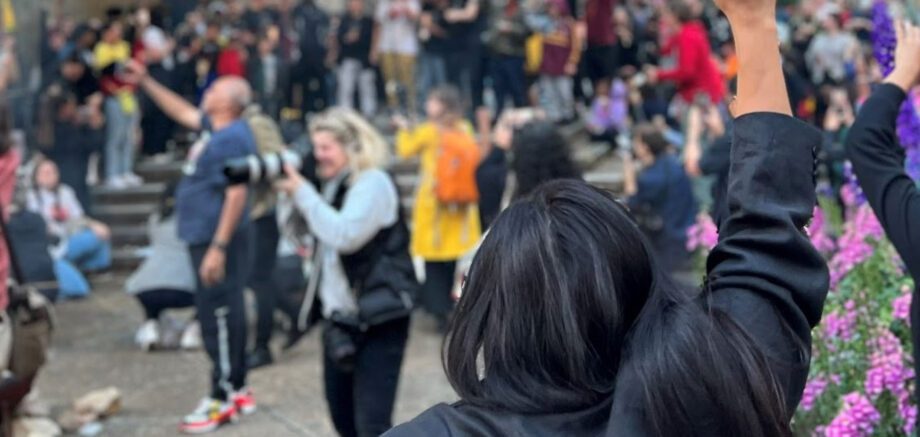Sarah Ibrahim has faced racism and discrimination in her personal and professional life and is committed to ensuring people of color, particularly women, have fair access to opportunities. By establishing the Racial Justice Centre over a year ago, Ibrahim, a commercial lawyer with extensive human rights advocacy experience, aims to expose the unseen racism and is seeking support in her mission.
Imagine being denied career prospects and having to work harder for less pay due to the color of your skin. Imagine your access to services being based on racial profiling and the quality of those services depending on assumptions about your ethnicity. Sarah Ibrahim doesn’t have to imagine. The Egyptian-born commercial and human rights lawyer knows how it feels.
Unlike many who suffer silently, Ibrahim has fought to address these challenges head-on. Her lived experiences motivated her to establish the Racial Justice Centre to shed light on racial inequality, particularly affecting women, an issue often overlooked by existing community legal services. Ibrahim identified a significant gap in access to legal services for those she refers to as the “missing middle.”
The Racial Justice Centre, Australia’s first of its kind, was established to provide diverse cost models for clients, including pro-bono and low-cost options, ensuring access to legal support for all impacted by racial injustice.
“I’m very determined to make the invisible visible.”
– RJC founder and executive director
Ibrahim emphasizes that race remains a significant issue, especially following the recent political climate. She highlights the insidious nature of racial discrimination and its impact on career advancement, access to justice, and the quality of services, particularly for women of color. She draws on her own experiences to illustrate the profound impact of covert discrimination, making it challenging for individuals to speak out due to fear of repercussions.
Ibrahim is dedicated to exposing the invisible nature of racism and discrimination, shedding light on the hidden challenges faced by many in society.
Charmaine Grant understands what it means to feel invisible. The RJC’s volunteer operations manager is of Aboriginal descent, with an Indigenous father and a mother from a migrant background. Grant, who has light skin, has often experienced a sense of not belonging due to her appearance.
Grant explains, “I’ve experienced racism and discrimination due to the privilege of appearing white because of my light skin, a common experience for many Aboriginal people in Australia. Growing up and not feeling white enough or black enough led to a sense of confusion and not fitting in anywhere.” Grant passionately describes her commitment to the pursuit of equity and justice, which led her to join the RJC after identifying with Ibrahim’s story.
Grant shares, “I heard about my parents’ experiences and had my own encounters, and I realized that there was no community legal service available for those facing racial discrimination or injustice. The purpose of the RJC spoke to me, and I wanted to make a positive contribution towards the goal of eliminating and educating about racism in Australia.” As a senior manager in operations for a sustainability engineering consultancy firm, Grant uses her expertise to help the RJC achieve its objectives.
“Even though I’m in a place of privilege, I don’t want others to have to feel the way I felt, especially after the Voice (referendum) – there was so much racism and division. I want to move towards something that is about collaboration and education. I want us all to be able to work together to end racial injustice and discrimination,” expresses Grant.
“Even though I’m in a place of privilege, I don’t want others to have to feel the way I felt, especially after the Voice (referendum) – there was so much racism and division. – RJC Volunteer operations manager Charmaine Grant”
Similarly driven by an awareness of racial discrimination, RJC volunteer paralegal Olivia Lam offers a unique perspective to the community legal service. Born to Chinese parents in Australia and later spending her formative years in the United States, Lam brings an international outlook to her involvement. Her passion for racial equality stems from her experiences in the US, where she encountered issues of discrimination, income inequality, and diversity during her schooling.
Lam shares, “My passion intensified when I moved back to Australia. When I started at a particular high school in Sydney, I quickly caught on to very dramatic and automatic divisions between students of different races. There seems to be a general indifference as to how race operates to disadvantage some and advantage others.”
Pursuing a double degree in Law and American Studies at the University of Sydney, Lam also works as a paralegal at a boutique commercial law firm while dedicating her time to the RJC. Although Lam has not personally experienced overt discrimination, she is driven by the impact of racism on those close to her.
Reflecting on the differences in racism between Australian and American societies, Lam notes, “The discourse in Australia is much less informed about the nuances of race discrimination. There’s much less awareness around covert racism, which is more systemic in workplaces or schools.”
Contributing to the RJC’s mission, Lam emphasizes the importance of informed discourse and advocating for change. She underscores the impact of community education and awareness in addressing issues often overlooked or considered taboo.
“`Racial Justice Centre Advocates for Change
The Racial Justice Centre (RJC) is advocating for political coalition building to address the separation between racism experienced by First Nations people and the wider racialized community. Olivia Lam, a volunteer paralegal at RJC, emphasizes the importance of creating awareness and deep sympathetic identification between the two groups. She notes the potential for coalition building within the RJC due to its diverse staff.
Meanwhile, RJC founder and executive director, Ibrahim, stresses the need for practical reform and resources, not just awareness, to bring about structural legislative change. She calls for the injection of resources and incentives for companies to address racial inequality in the workplace.
Ibrahim also advocates for a “positive duty towards racial equality” and a shift in the narrative surrounding Aboriginal people, urging society to recognize their contributions and treat them as powerful First Nations Australians.
RJC is seeking support from pro bono private law firms and legal practitioners to collaborate in their efforts to combat racism. They encourage contributions through in-kind support, secondments, and donations to cover operational costs.
RJC volunteer paralegal, Lam, finds representing the interests of marginalized groups to be a rewarding aspect of her voluntary work at the center.
The Racial Justice Centre is focused on addressing racial injustice and advocating for practical reforms while seeking support from the legal community and society at large to combat racism and promote equality.Supporting Racial Justice Centre
Courts can often pose challenges to individuals, particularly those who have experienced trauma or belong to marginalized communities, says Lam. She has gained valuable insights into legal practice and social justice work during her time at RJC, which she believes would benefit other aspiring lawyers as well. Working in an area where justice is not guaranteed requires creativity in constructing arguments, according to Lam, reflecting an enriching experience for young law professionals.
Grant, RJC’s operations manager, emphasizes the rewarding nature of volunteering at the Racial Justice Centre, not only for legal professionals but also for individuals with expertise in other fields. Contributing to a meaningful cause provides a sense of fulfillment and energy, says Grant. Those interested in supporting the Racial Justice Centre can contact the center through phone or email or visit their website for more information.




